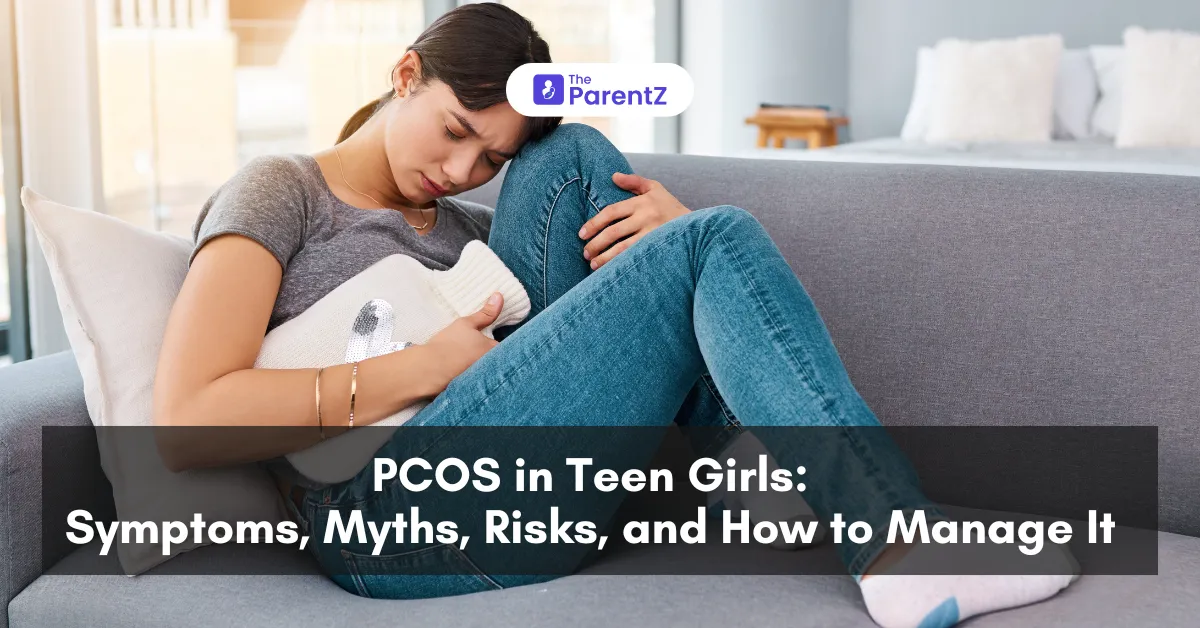Polycystic Ovary Syndrome (PCOS) is one of the most common hormonal disorders in teenage girls, yet many myths surround it. Some believe it only affects overweight girls, while others think it leads to infertility. In reality, PCOS is a complex condition that affects metabolism, skin, hair, and mental health.
What is PCOS?
PCOS is a hormonal disorder where the ovaries produce higher levels of androgens (male hormones), disrupting the menstrual cycle. This can lead to irregular periods, excessive hair growth, acne, and other health issues.
Despite its name, not all girls with PCOS develop cysts on their ovaries. The real problem lies in the hormonal imbalance and insulin resistance, which can lead to long-term health risks if not managed properly.
Who is More Prone to PCOS?
Some factors increase the risk of developing PCOS, including:
• Family history – If a mother or sister has PCOS, the chances of developing it are higher.
• Obesity or sudden weight gain – Excess body fat can lead to insulin resistance, which worsens PCOS symptoms.
• High insulin levels – If the body doesn’t use insulin properly, it can lead to hormonal imbalances.
• Sedentary lifestyle – Lack of physical activity and unhealthy eating habits can trigger PCOS symptoms.
• Chronic stress – Long-term stress and irregular sleep patterns can make PCOS worse.
Common Symptoms of PCOS in Teens
PCOS symptoms vary from person to person, but some of the most common signs include:
• Irregular or missed periods – Some girls may have fewer than eight periods a year, while others may experience heavy or prolonged bleeding.
• Excessive hair growth (hirsutism) – Unwanted hair may appear on the face, chest, back, or stomach due to high androgen levels.
• Acne and oily skin – PCOS can cause severe acne, especially on the jawline and chin.
• Weight gain and difficulty losing weight – Many girls with PCOS struggle with weight gain, particularly around the abdomen.
• Thinning hair or hair loss – Some girls experience hair thinning on the scalp, similar to male-pattern baldness.
• Dark patches on the skin – Areas like the neck, underarms, and thighs may develop dark, velvety patches due to insulin resistance.
• Mood swings and anxiety – Hormonal imbalances can lead to anxiety, depression, and emotional ups and downs.
Debunking Myths About PCOS
• Myth: PCOS only affects overweight girls.
Fact: PCOS can occur in girls of all body types, including those who are lean.
• Myth: PCOS causes infertility.
Fact: PCOS can make conception difficult, but it doesn’t mean infertility is certain. Many women with PCOS have healthy pregnancies with proper treatment.
• Myth: PCOS can be cured.
Fact: There is no permanent cure for PCOS, but it can be managed with lifestyle changes and medical treatment.
• Myth: Birth control pills cure PCOS.
Fact: Birth control helps regulate periods and symptoms, but it doesn’t cure PCOS. A balanced diet, exercise, and medical care are essential for long-term management.
Health Risks Associated with PCOS
If left unmanaged, PCOS can lead to serious health issues, including:
• Type 2 diabetes – Due to insulin resistance, PCOS increases the risk of developing diabetes.
• Heart disease – High cholesterol levels and obesity can contribute to cardiovascular problems.
• Infertility – Irregular ovulation may make it harder to conceive later in life.
• Sleep apnea – Breathing difficulties during sleep are more common in girls with PCOS.
• Depression and anxiety – The hormonal imbalance and physical symptoms can impact mental health.
How to Manage PCOS Naturally?
1. Eat a Balanced Diet
A healthy diet can help regulate insulin levels and hormone balance. Focus on:
• Whole foods like vegetables, fruits, nuts, and whole grains.
• Lean proteins such as beans, lentils, and dairy.
• Healthy fats from avocados, nuts, and olive oil.
• Avoiding processed foods, sugary drinks, and excess junk food.
2. Exercise Regularly
Physical activity helps manage weight and improves insulin sensitivity. Recommended exercises include:
• Walking or jogging for at least 30 minutes a day.
• Strength training to improve metabolism.
• Yoga or pilates to reduce stress and improve flexibility.
3. Get Enough Sleep
Poor sleep can worsen hormonal imbalances. Aim for 7-9 hours of quality sleep each night.
4. Manage Stress
Chronic stress can trigger PCOS symptoms. Stress management techniques include:
• Meditation or deep breathing exercises.
• Journaling or engaging in hobbies.
• Spending time outdoors or with loved ones.
5. Consider Medical Treatment
For severe symptoms, a doctor may prescribe:
• Birth control pills to regulate periods.
• Metformin to manage insulin resistance.
• Hormonal therapy for acne and excessive hair growth.
Conclusion
PCOS is a common but manageable condition. If you experience symptoms, it’s important to seek medical advice rather than ignore them. Understanding PCOS, adopting a healthy lifestyle, and following a doctor’s recommendations can help keep symptoms under control.
With the right approach, PCOS doesn’t have to control your life. Stay informed, take care of your body, and don’t hesitate to ask for support when needed.








Be the first one to comment on this story.